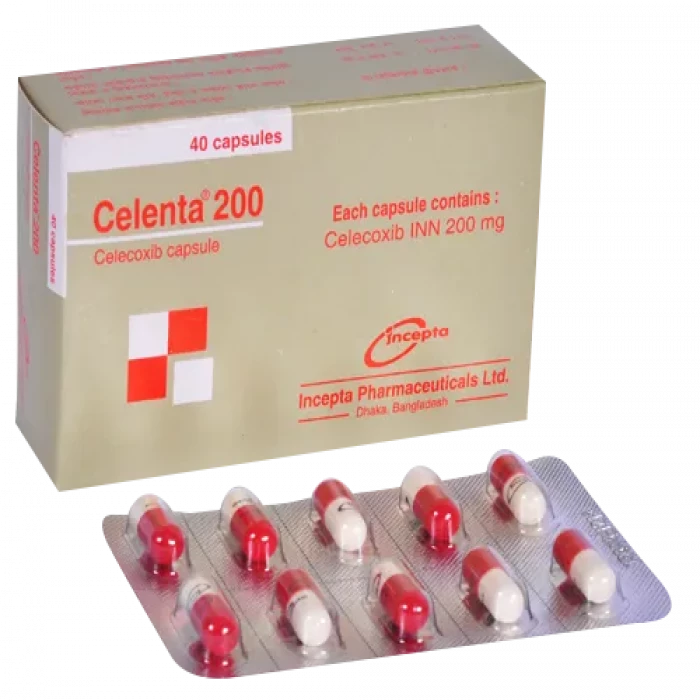
✔ 100% Authentic Product
👁️ Currently Viewing 1516
Celenta 200mg 10pcs
Capsule, Generic Name: Celecoxib, Manufacturer: Incepta Pharmaceuticals Ltd.
Discount
Price: ৳ 76
MRP:
৳
80
5%
Off
✅ Description:
Indications of Celenta 200mg Capsule
The use of Celenta 200mg Capsule is recommended.
For the relief of osteoarthritis signs and symptoms.
For the relief of rheumatoid arthritis indications and symptoms.
In patients with familial adenomatous polyposis, for the regression and prevention of colorectal adenomatous polyps (FAP).
Pharmacology of Celenta 200mg Capsule
Celecoxib is a non-steroidal anti-inflammatory medication that inhibits cyclooxygenase-2 (COX-2) (NSAID). Anti-inflammatory, analgesic, and antipyretic effects are all present. Celecoxib's mechanism of action is thought to be based on the inhibition of prostaglandin synthesis via the cyclooxygenase-2 (COX-2) enzyme. Celecoxib does not inhibit the cyclooxygenase-1 (COX-1) isoenzyme at therapeutic concentrations.
Celenta 200mg Capsule Dosage & Administration
Osteoarthritis: The recommended oral dose is 200 mg per day administered as a single dose or as 100 mg twice daily.
Rheumatoid arthritis: The recommended oral dose is 100 to 200 mg twice daily.
Familial adenomatous polyposis (FAP): Usual medical care for FAP patients should be continued while on Celecoxib. To reduce the number of adenomatous colorectal polyps in patients with FAP, the recommended oral dose is 400 mg (2x200 mg capsules) twice daily to be taken with food.
Interaction
ACE inhibitors: According to certain reports, NSAIDs may reduce the antihypertensive impact of ACE inhibitors. In patients taking Celecoxib and ACE inhibitors at the same time, this interaction should be taken into account.
In some people, NSAIDs can diminish the natriuretic action of Frusemide and thiazides.
Celecoxib can be combined with low-dose aspirin. In comparison to Celecoxib alone, simultaneous treatment of Aspirin with Celecoxib may increase the risk of gastrointestinal ulcers or other problems.
Fluconazole: Giving Celecoxib and Fluconazole at the same time resulted in a two-fold rise in Celecoxib plasma concentrative.
Contraindications
Celecoxib is not recommended for people who have a known hypersensitivity to the drug. Patients who have had allergic reactions to sulphonamides should not be given this medication (Celecoxib contains a sulphonamide side chain). Patients who have had asthma, urticaria, or allergic reactions after taking aspirin or other NSAIDs should not take celecoxib. In some patients, severe, seldom fatal, anaphylactic reactions to NSAIDs have been described.
Celenta 200mg Capsule Side Effects
Adverse events occurring in ≥2% of patients at recommended doses - Abdominal pain 4.1%, diarrhoea 5.6%, dyspepsia 8.8%, flatulence 2.2%, nausea 3.5%, back pain 2.8%, peripheral oedema 2.1%, accidental injury 2.9%, dizziness 2.0%, headache 15.8%, insomnia 2.3%, pharyngitis 2.3%, rhinitis 2.0%, sinusitis 5.0%, upper respiratory tract infections 8.1%, rash 2.2%. The following adverse events occurred in 0.1-1.9% of patients-
General: Allergy aggravated, allergic reaction, asthenia, chest pain, edema generalized, face edema, fatigue, fever, hot flushes, influenza-like symptoms, pain, peripheral pain.
Gastrointestinal: Constipation, diverticulitis, dysphagia, oesophagitis, gastritis, gastroenteritis, gastro-oesophageal reflux disease, hemorrhoids, hiatal hernia, melaena, dry mouth, stomatitis, tenesmus, tooth disorder, vomiting.
Cardiovascular: Aggravated hypertension, angina pectoris, coronary artery disease, myocardial infarction.
Nervous system: Leg cramps, hypertonia, hypoesthesia, migraine, neuralgia, neuropathy, paresthesia, vertigo. Female reproductive system: Breast fibroadenosis, breast neoplasm, breast pain, dysmenorrhoea, menstrual disorder, menorrhagia, vaginitis.
Pregnancy & Lactation
Celecoxib should only be taken during pregnancy if the possible benefit outweighs the danger to the fetus. Celecoxib should be avoided in late pregnancy since it can cause premature ductus arteriosus closure. Celecoxib is not known to be excreted in human milk. Because many medications are excreted in human milk, and because Celecoxib can cause major adverse reactions in nursing infants, a decision should be taken whether to stop breastfeeding or stop taking the drug, taking into account the drug's importance to the mother. Ribavirin is not known to be excreted in human milk by nursing mothers. Because many medicines are excreted in human milk, and to avoid any major ribavirin-related adverse events in nursing infants, a decision should be made whether to stop breastfeeding or to stop Ribavirin therapy.
Precautions & Warnings
Celecoxib, at doses up to 200 mg bid, can be administered without regard to the timing of the meal. Higher doses (400 mg bid) should be administered with food.
Storage Conditions
Keep out of children's reach. Store in a cool, dry location. Protect yourself from the sun.
⚠️Disclaimer:
At ePharma, we’re committed to providing accurate and accessible health information. However, all content is intended for informational purposes only and should not replace medical advice from a qualified physician. Please consult your healthcare provider for personalized guidance. We aim to support, not substitute, the doctor-patient relationship.






